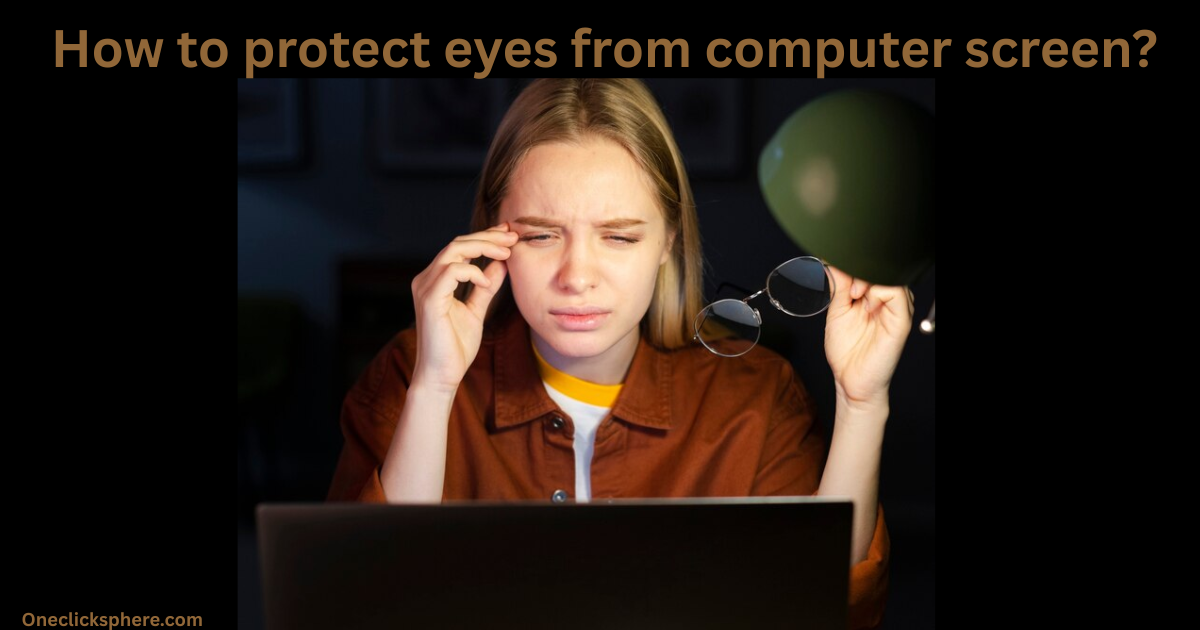Do your eyes feel tired after using a phone, laptop, or computer all day? You’re not alone. Long hours of screen time can cause dryness, blurry vision, and headaches. But the good news is, there are easy ways to protect your eyes. A few simple changes can make screen time safer and more comfortable, like as adjusting brightness to wearing blue light glasses. Let’s explore how to protect eyes from computer screen?
How Screen Time Affects Your Eyesight?
Too much time on phones, tablets, or computers can make your eyes feel tired and dry. This happens because we blink less while staring at a screen. Our eyes also struggle to focus when looking at bright screens for a long time, especially if the text is small or unclear. You might notice burning eyes, blurry vision, or even headaches after spending hours online. These are signs your eyes need rest.
Another problem is the strain on your eye muscles. When you look at a screen that’s too close, your eyes work harder to stay focused. If you already wear glasses, it can feel worse. This not only affects your eyes but also your neck and back. It can lead to long-term discomfort. That’s why taking short breaks and adjusting screen brightness is important for eye health.
Tips on how to protect eyes from computer screen
Use the 20/20/20 Rule
Your eyes get tired if you look at a screen for too long. They are not meant to focus on something close all day. To help them rest, try the 20/20/20 rule. After every 20 minutes on a screen, look at something far away, around 20 feet or 6 meters, for 20 seconds. This break can reduce eye strain and keep your eyes healthy. The longer you rest your eyes, the better they feel. Try to make this a daily habit.
Proper lighting in the room
Make sure your room’s lighting isn’t too bright to protect your eyes. To reduce glare when using a screen, turn down the lights or close the curtains. Go for a light level that is roughly half the size of an average office. Instead of bright fluorescent lights, choose gentler bulbs. During the day, full spectrum lighting is an excellent choice because it is soft on the eyes and feels like natural sunlight. Additionally, it could improve your energy and attitude.
Blink more
You blink less when you spend a lot of time staring at a screen. Your eyes may become tired and dry as a result. Your eyes stay moist and clear when you blink. You may get itching or painful eyes if you don’t blink sufficiently. The issue gets worse by the dry office air. Make an attempt to blink more particularly at work. Blink ten times every twenty minutes as a general rule. Slowly close your eyes as though you were going to sleep. This keeps your eyes healthy and helps spread tears throughout them. It’s a small habit that has a significant impact.
Reduce blue light
Blue light from screens can be harmful to your eyes, especially over time. It has a short wavelength that can cause eye strain and tiredness. To protect your eyes, you can wear blue light glasses while using a computer or phone. These glasses help block the harsh light and make screen time easier on your eyes. You can also turn on the blue light filter in your device settings. This is a smart way to reduce eye damage if you use screens for many hours each day.
Get a screen protector
A simple way to care for your eyes is by using a screen protector. Some screen protectors are made to block blue light, which can hurt your eyes over time. You can find them for both phones and computers. They help reduce glare and make the screen softer on your eyes. This is a good option if you work or watch videos on screens for many hours. It’s easy to use and adds extra comfort while using your device.
Regular eye exams
It’s critical for your eye health to have regular eye exams. An eye specialist can check to see if there is a more serious issue than just restless eyes or if everything is well. Frequent examinations help in identifying problems early. You can also ask questions about how you use screens and how to better care for your eyes at this time. It’s important to get an eye exam once a year, even if your eyes feel OK.
Use high-resolution screens
Your eyes can benefit greatly from using a high-quality screen. CRT panels and other old monitors flicker and strain the eyes. An LED screen with a non-glare surface is preferable. To lessen flicker, try to select one with a high refresh rate, such as 75 Hz or above. Additionally, since sharp visuals are easier on the eyes, a high-resolution screen is beneficial. Get a larger screen (at least 47 cm if possible) and aim for a small dot pitch of 0.28mm or less. Over time, these functions can safeguard your eyes and make screen time more comfortable.
Limit screen time before bed
Using phones or computers right before bed can make it harder to sleep. The blue light from screens tells your brain to stay awake, even when you’re tired. This light can mess with your sleep routine and keep you from feeling rested. Try to stop using screens at least one to two hours before bedtime. You can also turn on “night mode” or “dark mode” in the evening to reduce blue light. Reading a book or listening to soft music is a better way to relax before sleep. This helps your mind and body get ready for rest.
Reduce glare
Screen glare can cause eye strain and make it difficult to focus. Light is caught by glass screens, which causes the issue. Try using an anti-glare screen or a matte screen filter to prevent this. These improve viewing comfort and lessen reflections. Select lenses with an anti-reflective coating if you use spectacles. This reduces glare and safeguards your eyes when using a computer. To further lessen glare, attempt to place your screen away from bright windows or lights.
Use blue light glasses
One smart technique to shield your eyes from blue light is to wear computer glasses. The purpose of these specialized glasses is to lessen the harmful blue light emitted by screens and LED lights. Around 50% of blue light is blocked by some glasses, particularly at the 455 nm range, which is the most common and intense light from digital gadgets. While some still let some beneficial blue light from 455 to 500 nm, others completely block blue light from 400 to 455 nm. This part of blue light might increase your energy and mood. You can feel better and lessen eye strain when you use these glasses during screen time.
How to protect eyes from phone screens?
- Lower screen brightness or use auto-brightness to match your surroundings.
- Hold your phone at least 16 to 18 inches away from your eyes.
- Turn on night mode to reduce eye strain during evening use.
- Increase text size instead of bringing the phone closer.
- Blink often to keep your eyes moist and prevent dryness.
- Use a matte screen protector to reduce glare.
- Apply artificial tears if your eyes feel dry or tired.
How to protect eyes from laptop screens?
- Adjust your screen brightness so it’s not too bright or too dim for the room.
- Use the 20-20-20 rule: every 20 minutes, look at something 20 feet away for 20 seconds.
- Keep your laptop screen at eye level and about an arm’s length away.
- Use an anti-glare screen protector to reduce reflections and shine.
- Turn on blue light filter or night mode, especially in the evening.
- Take short breaks to rest your eyes and blink often to keep them moist.
Conclusion:
It’s not difficult to shield your eyes from screens. Little routines like using night mode, blinking more, and sticking to the 20-20-20 rule can make a big difference. Wear blue light-blocking eyewear, choose suitable lighting, and maintain glare-free, spotless screens. Additionally, remember to get your eyes tested once a year and take rests. Even with long use of screens, your eyes may remain healthy and fresh with a little attention.

